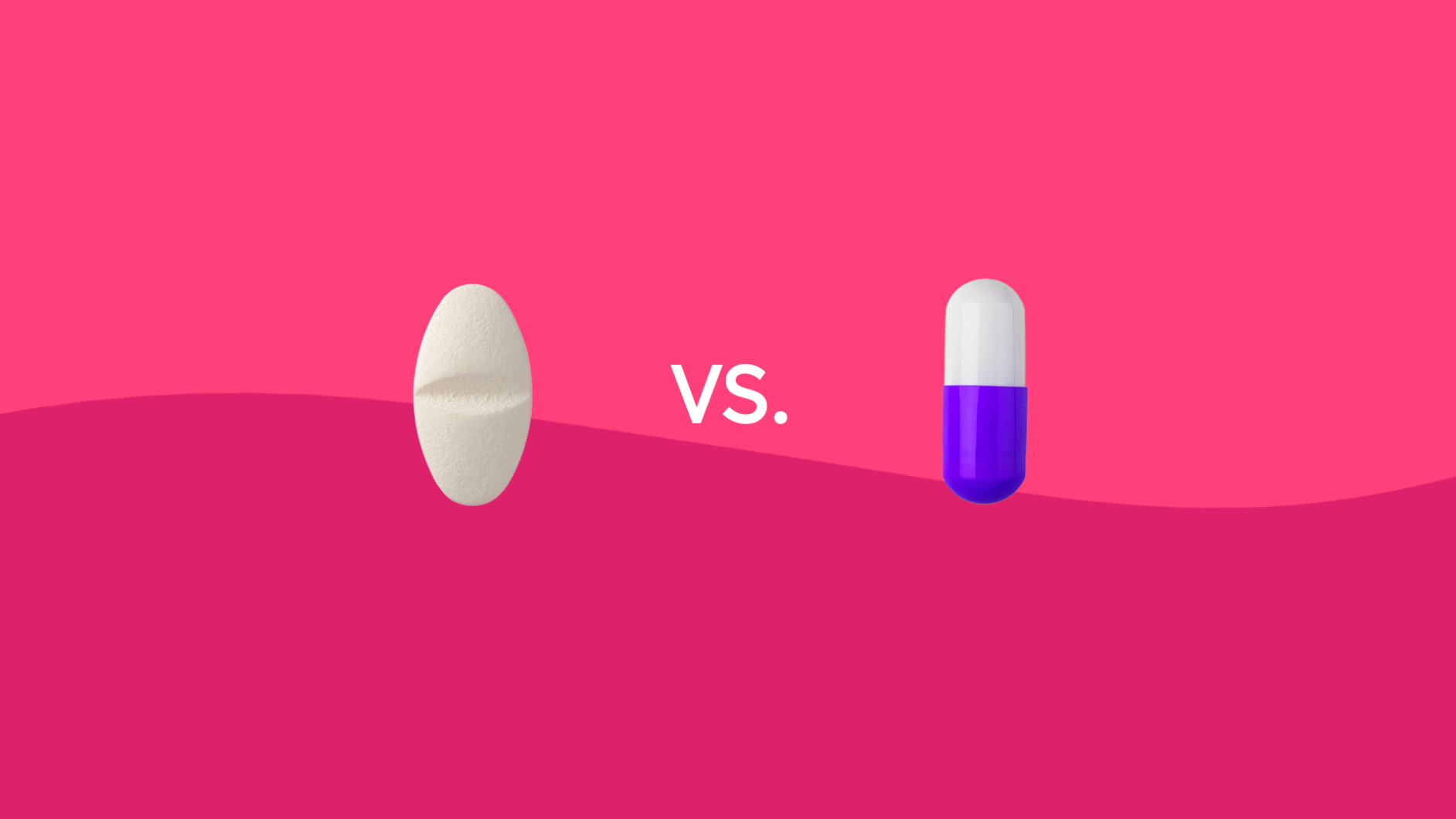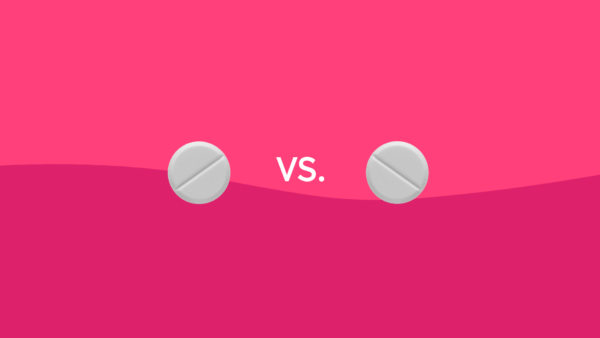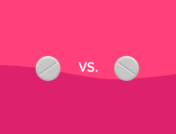Drug overview & main differences | Conditions treated | Efficacy | Insurance coverage and cost comparison | Side effects | Drug interactions | Warnings | FAQ
Cymbalta and Lexapro are two prescription medications that are used to treat major depressive disorder (MDD) and other related mental health disorders. Depression, anxiety, and related disorders affect millions of Americans according to the Anxiety and Depression Association of America.
Mental health disorders affect mood, productivity, and an individual’s ability to handle stress. For some, things like exercise, meditation, or therapy may provide relief, but for many, medication will be needed to achieve a remission of symptoms. While Cymbalta and Lexapro treat many similar disorders, they are different medications, and we will discuss those differences here.
What are the main differences between Cymbalta and Zoloft?
Cymbalta (duloxetine) is a prescription medication indicated in the treatment of both major depressive disorder and generalized anxiety disorder (GAD). Cymbalta belongs to a group of medications known as selective serotonin-norepinephrine reuptake inhibitors (SNRIs). Cymbalta blocks the reuptake of both norepinephrine and serotonin in the neuronal synapse leaving more free serotonin and norepinephrine. These neurotransmitters are then more readily available to play a positive role on mood and affect. Other SNRIs you may be familiar with are Effexor (venlafaxine) and Pristiq (desvenlafaxine). Cymbalta is available as a 20 mg, 30 mg, and 60 mg oral capsule.
Zoloft (sertraline) is also a prescription medication indicated in the treatment of MDD. Zoloft is classified as a selective serotonin reuptake inhibitor and works by blocking the reuptake of only serotonin at the neuronal synapse. Higher levels of available serotonin are associated with improved mood and energy levels. Other SSRIs you may be familiar with include Prozac (fluoxetine), Paxil (paroxetine), Celexa (citalopram), and Lexapro (escitalopram).
Zoloft is available as an oral tablet in strengths of 25 mg, 50 mg, and 100mg. It is also available in an oral concentrated solution that is 20 mg/ ml.
| Main differences between Cymbalta and Zoloft | ||
|---|---|---|
| Cymbalta | Zoloft | |
| Drug class | Selective serotonin norepinephrine reuptake inhibitor | Selective serotonin reuptake inhibitor |
| Brand/generic status | Brand and generic available | Brand and generic available |
| What is the generic name? | Duloxetine | Sertraline |
| What form(s) does the drug come in? | Oral capsule | Oral tablets and solution |
| What is the standard dosage? | 60 mg once per day | 50 mg once per day |
| How long is the typical treatment? | Long-term (months to years) | Long-term (months to years) |
| Who typically uses the medication? | Adolescents and adults | Children, adolescents, and adults |
Conditions treated by Cymbalta and Zoloft
Cymbalta and Zoloft are each approved to treat major depressive disorder, but each drug has unique indications as well. Cymbalta is approved to treat generalized anxiety disorder. Cymbalta is also approved to treat nerve pain and chronic pain. This sets Cymbalta apart from other antidepressant medications as it is the only one approved in pain-related diagnoses.
Zoloft is approved by the Food and Drug Administration (FDA) in the treatment of social anxiety disorder and obsessive-compulsive disorder (OCD). It is used off-label in generalized anxiety disorder and separation anxiety disorder. Off-label use indicates that the intended use has not been approved by the FDA.
This table of indications is for informational purposes only and is not meant to be medical advice. Please visit your healthcare professional to determine which treatment is best for your condition.
| Condition | Cymbalta | Zoloft |
| Major depression | Yes | Yes |
| Generalized anxiety | Yes | Off-label |
| Pain associated with diabetic neuropathy | Yes | No |
| Pain associated with fibromyalgia | Yes | No |
| Chronic musculoskeletal pain | Yes | No |
| Stress urinary incontinence | Off-label | No |
| Social anxiety disorder | No | Yes |
| Obsessive-compulsive disorder | No | Yes |
| Separation anxiety disorder | No | Off-label |
| Posttraumatic stress disorder | No | Yes |
| Panic disorder | No | Off-label |
| Hot flashes due to menopause | No | Off-label |
| Premature ejaculation | No | Off-label |
Is Cymbalta or Zoloft more effective?
A study published in 2016 directly compared Cymbalta and Zoloft on their efficacy in treating depression, and the study looked at specific symptoms of depression. Overall, both drugs were shown to be effective at treating depression, with one not being significantly better than the other overall. However, when looking at specific symptoms, each drug appeared to have a distinct advantage with particular symptoms. The group treated with Cymbalta showed more improvement with regard to psychomotor impairment, somnolence, and sexual impairment. The Zoloft group showed more improvement in symptoms such as agitation, anxiety, and hypochondriasis. Both Cymbalta and Zoloft are effective at treating depression, but this study suggests prescribers should pay specific attention to an individual’s most prevalent symptoms when selecting therapy.
Coverage and cost comparison of Cymbalta vs. Zoloft
Cymbalta is a prescription drug that is typically covered by both commercial and Medicare drug plans. The out-of-pocket price for Cymbalta 60 mg can be more than $300, but with a coupon from SingleCare, you could get the generic for as low as $15 at participating pharmacies.
Zoloft is also a prescription drug that is generally covered by both Medicare and commercial drug plans. The out-of-pocket price of brand-name Zoloft may be over $400, but you can use a coupon from SingleCare to get the generic version for $10.
Get the SingleCare prescription discount card
| Cymbalta | Zoloft | |
| Typically covered by insurance? | Yes | Yes |
| Typically covered by Medicare Part D? | Yes | Yes |
| Standard dosage | 30, 60 mg capsules | 30, 50 mg tablets |
| Typical Medicare copay | Less than $10 | Less than $10 |
| SingleCare cost | $15+ | $10+ |
Common side effects of Cymbalta vs. Zoloft
Cymbalta and Zoloft are both known to cause gastrointestinal disturbances such as nausea, diarrhea, and constipation. Nausea is the most prevalent side effect for both drugs overall and can impact the quality of life. If you experience nausea that is impacting your day-to-day activities, you should let your prescriber know.
Somnolence, or excessive sleepiness or drowsiness, is also one of the adverse effects of both Cymbalta and Zoloft. Patients taking Cymbalta may also experience headaches and increased blood pressure. Cymbalta, however, does not appear to affect libido, whereas Zoloft use can.
This table is not intended to be a complete list of possible side effects and is for informational purposes only. Please consult your healthcare professional for a complete list.
| Cymbalta | Zoloft | |||
| Side effect | Applicable? | Frequency | Applicable? | Frequency |
| Nausea | Yes | 23% | Yes | 26% |
| Dry mouth | Yes | 13% | Yes | 14% |
| Sweating | Yes | 6% | Yes | 7% |
| Diarrhea | Yes | 9% | Yes | 4% |
| Constipation | Yes | 9% | Yes | 6% |
| Dyspepsia | No | n/a | Yes | 8% |
| Dizziness | Yes | 9% | Yes | 12% |
| Somnolence | Yes | 10% | Yes | 11% |
| Headache | Yes | 14% | No | n/a |
| Increased blood pressure | Yes | 2% | No | n/a |
| Decreased appetite | Yes | 7% | Yes | 3% |
| Decreased libido | No | n/a | Yes | 6% |
Source: Cymbalta (DailyMed) Zoloft (DailyMed)
Drug interactions of Cymbalta vs. Zoloft
Cymbalta and Zoloft share some common drug interactions, but there are some that are specific to each drug as well. Cymbalta inhibits CYP2D6, an enzyme responsible for the metabolism of many drugs including amphetamine-related drugs. Amphetamines are used in the treatment of attention deficit disorders, which may occur in patients with depression or anxiety as well. Cymbalta’s inhibition of this enzyme may result in increased blood levels of amphetamines. Patients who are on both types of drugs should be monitored closely.
Cymbalta and Zoloft have the potential to cause serotonin syndrome when mixed with other drugs with serotonergic actions. Serotonin syndrome is the result of abnormally high levels of free serotonin and can result in agitation, dizziness, and increased heart rate. Drugs such as the migraine medication eletriptan or the supplement St. John’s Wort may cause this interaction.
Zoloft may cause a specific type of cardiac arrhythmia known as a prolonged QTc interval when taken with certain classes of medication. It is important that your healthcare professional and pharmacist have a complete list of medications you are taking in order to appropriately screen for potential interactions.
The following list is not intended to be a complete list of drug interactions. Your doctor or pharmacist can provide a complete list.
| Drug | Drug class | Cymbalta | Lexapro |
| Almotriptan Eletriptan Oxitriptan |
5HT Agonist / Triptans (antimigraine agents) | Yes | Yes |
| Amphetamine salts Dexmethylphenidate Methylphenidate |
Amphetamines | Yes | Yes |
| Alosetron Ondansetron Ramosetron |
5HT3 Antagonists (anti-nausea agents) |
No | Yes |
| Aripiprazole | Antipsychotic | Yes | Yes |
| Aspirin Ibuprofen Naproxen Diclofenac |
Nonsteroidal anti-inflammatory drugs (NSAIDs) | Yes | Yes |
| Enoxaparin Heparin |
Anticoagulants | No | Yes |
| Buspirone | Antianxiety | Yes | Yes |
| Carbamazepine | Anticonvulsant | No | Yes |
| Esomeprazole Omeprazole |
Proton pump inhibitor | No | Yes |
| Fluconazole | Antifungal | No | Yes |
| Fluoxetine Citalopram Paroxetine Escitalopram |
SSRIs | Yes | Yes |
| Hydroxychloroquine | Aminoquinolone/ Antimalarial |
No | Yes |
| Linezolid | Antibiotic | Yes | Yes |
| Metaxalone | Muscle relaxers | Yes | Yes |
| Pimozide | Antipsychotic | No | Yes |
| Selegiline Phenelzine Rasagiline |
Monoamine oxidase inhibitor (MAOI) | Yes | Yes |
| St. John’s Wort | Herbal supplement | Yes | Yes |
| Hydrochlorothiazide Chlorthalidone Metolazone |
Thiazide diuretics | No | Yes |
| Tramadol | Opiate pain reliever | Yes | Yes |
| Amitriptyline Clomipramine Doxepin Nortriptyline |
Tricyclic antidepressants | Yes | Yes |
Warnings of Cymbalta and Zoloft
It is important to understand that neither Cymbalta nor Zoloft will produce an immediate remission of symptoms of either depression disorder or anxiety disorder. It will take a minimum of two weeks to notice any change in most post patients, and up to four to six weeks to realize the full effect of the medication. Do not prematurely discontinue your medication with the belief that it is not working without first speaking to your prescriber.
Patients with MDD may experience a worsening of depression or suicidal thoughts whether or not they are taking antidepressant medications. These conditions may worsen until remission is achieved. Cymbalta and Zoloft therapy may increase suicidal ideation and thoughts among teens and young adults, especially in the early stages of treatment. These patients must be monitored closely if this treatment is deemed medically necessary. A therapy change may be necessary if symptoms suddenly arise or get worse.
There have been reports of liver failure, sometimes fatal, with Cymbalta. These cases may present with abdominal pain and elevated liver enzymes with or without jaundice. The consumption of alcohol may increase this risk, and therefore this combination should be avoided.
Zoloft may cause a specific type of cardiac arrhythmia known as a prolonged QTc interval when taken with certain classes of medication. It is important that your healthcare professional and pharmacist have a complete list of medications you are taking in order to appropriately screen for potential interactions. Please seek medical advice from your healthcare provider before beginning any new therapies.
Serotonin syndrome has been reported with all SSRIs and SNRIs, including Cymbalta and Zoloft. This is a condition related to abnormally high levels of serotonin and can result in the patient feeling agitated, dizzy, and having an increased heart rate.
Frequently asked questions about Cymbalta vs. Zoloft
What is Cymbalta?
Cymbalta (what is Cymbalta?) is a prescription antidepressant medication used in the treatment of major depression, generalized anxiety disorder, and various neuropathic and musculoskeletal pain disorders. Cymbalta is in a class of drugs known as selective serotonin-norepinephrine reuptake inhibitors (SNRIs). Cymbalta is available as an oral capsule in 20 mg, 30 mg, and 60 mg strengths.
What is Zoloft?
Zoloft (what is Zoloft?) is a prescription antidepressant medication used in the treatment of major depressive disorder as well as other anxiety and psychiatric disorders. Zoloft is in a class of drugs known as selective serotonin reuptake inhibitors (SSRIs). Zoloft is available as oral tablets in 25 mg, 50 mg, and 100 mg strengths, as well as an oral liquid concentrate.
Are Cymbalta and Zoloft the same?
While both Cymbalta and Zoloft treat depression and a variety of mental health disorders, they are not the same type of drug. Cymbalta is in a class of drugs known as selective serotonin-norepinephrine reuptake inhibitors (SNRIs), and it causes an increase in both available serotonin and norepinephrine. Zoloft is in a class of drugs known as selective serotonin reuptake inhibitors (SSRIs) and causes an increase in available serotonin.
Is Cymbalta or Zoloft better?
Cymbalta and Zoloft are comparable in their ability to treat depression. Cymbalta carries an additional indication for generalized anxiety. It is important to look at specific depression symptoms and potential side effects when deciding which drug is best for a particular patient.
Can I use Cymbalta or Zoloft while pregnant?
The FDA considers both Cymbalta and Lexapro (what is Lexapro) pregnancy category C, meaning there have not been adequate human studies to determine safety. With Cymbalta, non-teratogenic effects have been observed in newborns following the administration of Cymbalta while pregnant. These include respiratory distress, feeding difficulty, and tremors. In general, either drug should only be used with the benefit to the mother clearly outweighs the risk to the fetus.
Can I use Cymbalta or Zoloft with alcohol?
Patients should avoid significant alcohol intake if taking Cymbalta or Zoloft. Alcohol can increase the toxic effects of both medications and can cause significant psychomotor impairment. With Cymbalta specifically, alcohol increases the incidence of liver impairment.
What is the best antidepressant with the least side effects?
Antidepressant medications on the market in the United States have been through thorough testing to ensure they are effective in treating depression. They each have side effects that occur with different prevalence. Your doctor will consider your specific depression symptoms as well as the side effects which concern you the most when selecting therapy.
Does Zoloft affect you sexually?
The manufacturer reports that as much as 6% of patients may experience decreased libido, or decreased sex drive, while taking Cymbalta. Patients who experience this should speak with their healthcare professional about possible alternatives.
Which is better: Prozac or Zoloft?
There is data to suggest that Zoloft may be superior to Prozac (what is Prozac) in terms of efficacy when treating depression. However, prescribers will take many factors into consideration when selecting therapy. Only your doctor can decide which may be the best fit for you.





